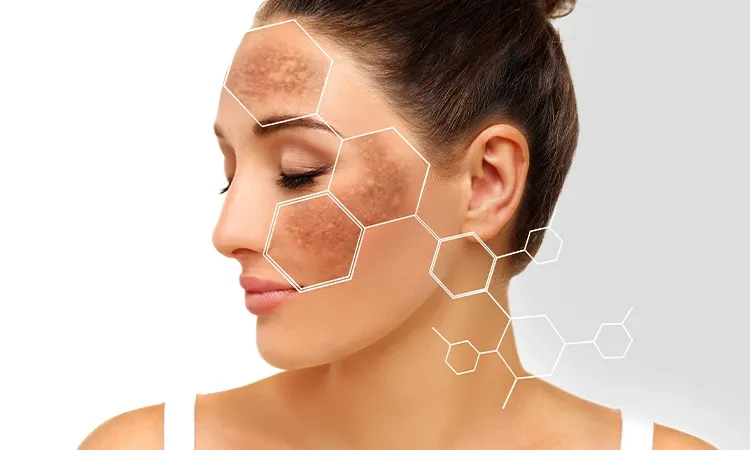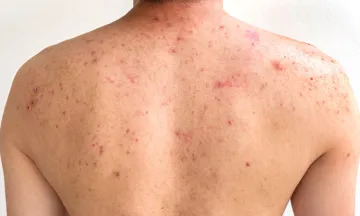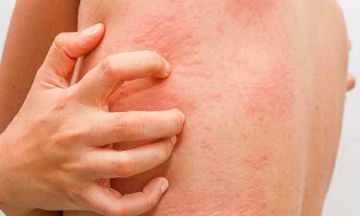Hyperpigmentation: All You Need to Know
Hyperpigmentation is among the most common skin concerns and affects a large part of the Indian population.
Several factors can cause excessive pigmentation on the skin. In most cases, it is harmless and is treated only for aesthetic purposes. However, in rare instances, hyperpigmentation can be a symptom of an underlying health condition.
Learn more about skin hyperpigmentation, its causes, treatments, and prevention tips.
- Hyperpigmentation: All You Need to Know
- Understanding the Basics of Hyperpigmentation
- Exploring the Causes of Hyperpigmentation
- Treatment Options for Hyperpigmentation
- Prevention and Skincare Tips
- Consulting a Dermatologist for Professional Advice
- Conclusion
Understanding the Basics of Hyperpigmentation
Hyperpigmentation refers to extra or excess pigmentation or colouring on the skin. It causes skin to darken in small spots, large patches, or the entire body. While it can happen to anyone, people with darker skin, prolonged sun exposure, and certain health conditions are more prone to it. Pregnancy is also a risk factor.
What is Hyperpigmentation?
Your skin layers contain a group of cells called melanocytes. These cells produce the pigment melanin, which protects the skin from the sun's harmful rays. Certain factors trigger excess melanin production, leading to dark patches on the skin.
Types of Hyperpigmentation?
Dark pigmentation can be of varying types based on the underlying causes. Below are the common forms of hyperpigmentation.
- Melasma: Changes in hormonal levels often cause melasma, which is prevalent in pregnancy. The effects of melasma can appear anywhere on the body but are more apparent on the forehead, face, and stomach.
- Liver Spots: Liver or sunspots stem from excess pigmentation through prolonged and frequent sun exposure. Also called solar lentigines, liver spots usually result in hyperpigmentation on the face, hands, neck, and other exposed body areas. People in older age groups are more prone to this condition.
- Post-inflammatory: Dark spots often appear at an injury or inflammation site. Inflammatory conditions like eczema and acne are prime examples.
Exploring the Causes of Hyperpigmentation
As mentioned earlier, excess skin colouring is caused by heightened melanin production. Several factors can trigger this.
Let us discuss them below.
Sun Exposure
The face is the most susceptible to hyperpigmentation because it is the most exposed body part to the sun.
Sun exposure triggers melanin production, which is the general cause of tanning. Sometimes, this trigger leads to the formation of dark patches, common in areas where sunlight reaches the most.
Hormonal Influences
Hormonal changes also cause the skin to darken. Pregnancy induces many drastic changes in hormonal levels. Hence, melasma is common during pregnancy.
Oestrogen and progesterone are the primary causative hormones for the condition.
Skin Injuries and Inflammation
Injuries and inflammations are a form of trauma to the skin, which triggers melanin production. That is why areas affected by eczema or acne often darken. In this case, the excess pigment may fade in a few weeks or more.
Genetic Factors
Over 125 genes in your body contribute to pigment-related features. Therefore, genetic factors can cause hyperpigmentation. You could inherit this gene, or certain lifestyle and environmental factors may trigger this aspect of your genes.
Health Conditions
Certain health conditions may have dark colouring as a symptom. Addison's disease, a rare endocrine condition, is a prime example. This condition is characterised by hyperpigmentation on the face, hands, knees, and other body parts that are frequently exposed to sun and friction.
Treatment Options for Hyperpigmentation
Hyperpigmentation is not a medical emergency. However, it affects your appearance, so most people seek treatment for aesthetic purposes. Below are some skin hyperpigmentation treatment options.
Topical Treatments
Dermatologists prescribe topical ointments as the primary solution for hyperpigmentation. For mild to moderate cases, this treatment suffices.
The following ingredients work best in topical ointments for dark colouration:
- Hydroquinone
- Retinoids
- Azelaic acid
- Kojic acid
- Corticosteroids
These components generally take a few months to lighten your skin to its normal shade. However, excessive and continuous use of ingredients, like hydroquinone, may worsen pigmentation, causing a condition called ochronosis.
Chemical Peels
Chemical peels are an effective hyperpigmentation treatment for face. It works for moderate-to-severe cases of hyperpigmentation. This method uses concentrated forms of certain chemical solutions.
The doctor applies a layer of the solution to your face and leaves it on for some time. When the peel is removed, it takes away the few top layers of your skin.
While this treatment helps reduce hyperpigmentation, strong acids can irritate your skin. Therefore, you are advised to undergo this treatment under the guidance of a certified dermatologist.
Laser Therapy
Lasers are beams of light that can penetrate the deep layers of the skin. Ablative laser peels often cause peeling in the top layers of the skin and aid in hyperpigmentation removal. This method works in the deep layers of your dermis and is an effective body hyperpigmentation treatment solution.
Intense Pulsed Light (IPL) therapy is another non-ablative laser treatment method. It is an effective and mild hyperpigmentation treatment for the face that stimulates collagen production at the target sites.
Microdermabrasion
This method involves a hand-held tool with an abrasive surface, usually made of micro-thin wires. The doctor rolls the tool's abrasive surface over your face or the affected area, creating micro-punctures that trigger the healing mechanism in your skin layers. It helps address scars and pigmentation.
Natural Remedies
Many natural ingredients have components and properties that reduce or inhibit melanin production, thus helping reduce hyperpigmentation. Some examples are as follows:
- Aloe Vera: Its component, aloesin, inhibits melanin production.
- Licorice: It contains glabridin, which is rich in antioxidant and anti-inflammatory properties.
- Green Tea: It has anti-inflammatory and antioxidant qualities and protects from melasma and sunburn.
Prevention and Skincare Tips
With some extra care and consideration, you can prevent hyper-coloration of your skin. Here are some preventive tips from dermatologists:
Use Sun Protection
Sun protection is crucial, not only to prevent dark spots but also to maintain overall skin health. Always use sunscreen with an SPF of 30 to 50 during the day, even when you are staying indoors. Reapply on a clean face every 2 to 3 hours for the best protection. If you are sweating or swimming, reapply more frequently.
Adopt a Gentle Skincare Routine
Skincare for hyperpigmentation is simple and brief. It includes keeping your skin hydrated and moisturised and using proper sun protection. Add retinoids, azelaic acid, and other similar components to the routine. You can also engage in weekly or biweekly exfoliation. Remember to use mild exfoliants and avoid scrubs with large, grainy particles.
Use Vitamin C for Brighter Skin
Vitamin C is known for its antioxidant properties. It gets rid of free radicals and prevents melanin production, thus giving you brighter skin.
Avoid Skin Irritants
Notice your skin's reaction to every new product you apply. Note down the components that irritate your skin and avoid them in the future. Frequent exposure to irritants can lead to inflammation, which is a major cause of skin hyperpigmentation.
Consulting a Dermatologist for Professional Advice
No two skin diagnoses are the same. If two people have hyperpigmentation, they might differ in the causative factors and the most-suited treatment options. Expert advice helps you gain more perspective on your condition and find the best treatment option.
Benefits of Professional Guidance
- Professionals focus on determining the cause of dark colouration.
- They propose treatment methods tailored to the underlying cause of your condition and your skin's unique characteristics, including its type and sensitivities.
- They offer proper guidance for the use of different ointments, natural ingredients, and other medications.
- There is minimal to no chance of you further aggravating your skin concern by using the wrong products or methods.
- They keep track of the progress offered by any treatment and continue with it or suggest other options accordingly.
Recommended Treatments
- Topical ointments
- Chemical peels
- Microdermabrasion
- Laser therapy
- Dermabrasion
- Retinoids and Vitamin C
Conclusion
It is crucial to consider your skin sensitivities while looking for ways to reduce hyperpigmentation on the face. Expert guidance can help you navigate this path with minimal to no risk of further irritating your skin.
At Dr Batra's®, we offer holistic and patient-friendly solutions to your skin concerns. Following the principles of Homeopathy, we work on addressing the root of your issues. We believe in the therapeutic powers of different medicinal components and use them to address your body's metabolic stresses or triggers that lead to different skin concerns.
You get the most empathetic, comfortable, and considerate care and reliable skin solutions at Dr Batra's® Clinic.




